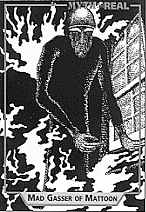Putting Mattoon’s Mad Gasser In Context
Posted by: Loren Coleman on January 22nd, 2011

Art: Jerry D. Coleman.
Researcher, author, and songwriter Jerry Clark passes this one along. It is hardly cryptozoological, but it certainly is Fortean. The reasoning and context in which anomalous incidents are reported and the way investigations are conducted are surely familiar to readers here.

This is an editorial response to the notoriety already attached to the “mad gasser of Mattoon,” usually ascribed to mass hysteria. The local newspaper’s role in the episode was much criticized. Its point, however, is not unreasonable: the early reports, whatever their cause, were made apart from any popular panic. — J. Clark
_____Mattoon [Illinois] Daily Journal-Gazette
September 20, 1944
THE “PERFUMED CITY” SPEAKS
The following three paragraphs are from an editorial which appeared in Tuesday’s [September 19] Decatur [Illinois] Herald:
“Autumn is a season of odors, mainly pleasant odors from the harvest field, from picnic fires, from fall flowers and fruits ripening on tree and vine.
“There are unpleasant odors, too, some of them with us the year around but accentuated in the fall. The gaseous wastes from busy industrial plants sometimes taint the air and then there are rotting cabbages and cantaloupes in the desolate Victory Gardens.
“All this season of the year odors are sniffed not merely by individuals but by entire communities. Our neighbors in Mattoon sniffed their town into newspaper headlines from coast to coast.”
The article then goes on to tell about odors in Maryland and Iowa, and the whole piece is designed to give Mattoon a neat ribbing about her recent “mad anesthetist” case.
The humor is o.k., in fact it does any city good to laugh at itself once in awhile [sic], but the article overlooks the indisputable fact that there was a “mad gasser” at large here at first. There are two principal reasons why he was not caught. One is that our police failed to take the case seriously enough at first. The other is that, when the police finally decided there was “something to it,” mass hysteria and outside interference combined to make their efforts unsuccessful.
Anyone who disputes the fact that some gas was used in the early stages of the case must buck the word of some of the nation’s most noted chemical investigators who quietly worked in Mattoon for three days. They agreed on the presence of gas in the first few cases, but admitted they could not identify it.
It never occurred to The Journal-Gazette to suggest to the investigators the possibility that some of Decatur’s famous odors, carried Mattoonward by the wind, might have caused our trouble.

About Loren Coleman
Loren Coleman is one of the world’s leading cryptozoologists, some say “the” leading living cryptozoologist. Certainly, he is acknowledged as the current living American researcher and writer who has most popularized cryptozoology in the late 20th and early 21st centuries.
Starting his fieldwork and investigations in 1960, after traveling and trekking extensively in pursuit of cryptozoological mysteries, Coleman began writing to share his experiences in 1969. An honorary member of Ivan T. Sanderson’s Society for the Investigation of the Unexplained in the 1970s, Coleman has been bestowed with similar honorary memberships of the North Idaho College Cryptozoology Club in 1983, and in subsequent years, that of the British Columbia Scientific Cryptozoology Club, CryptoSafari International, and other international organizations. He was also a Life Member and Benefactor of the International Society of Cryptozoology (now-defunct).
Loren Coleman’s daily blog, as a member of the Cryptomundo Team, served as an ongoing avenue of communication for the ever-growing body of cryptozoo news from 2005 through 2013. He returned as an infrequent contributor beginning Halloween week of 2015.
Coleman is the founder in 2003, and current director of the International Cryptozoology Museum in Portland, Maine.









